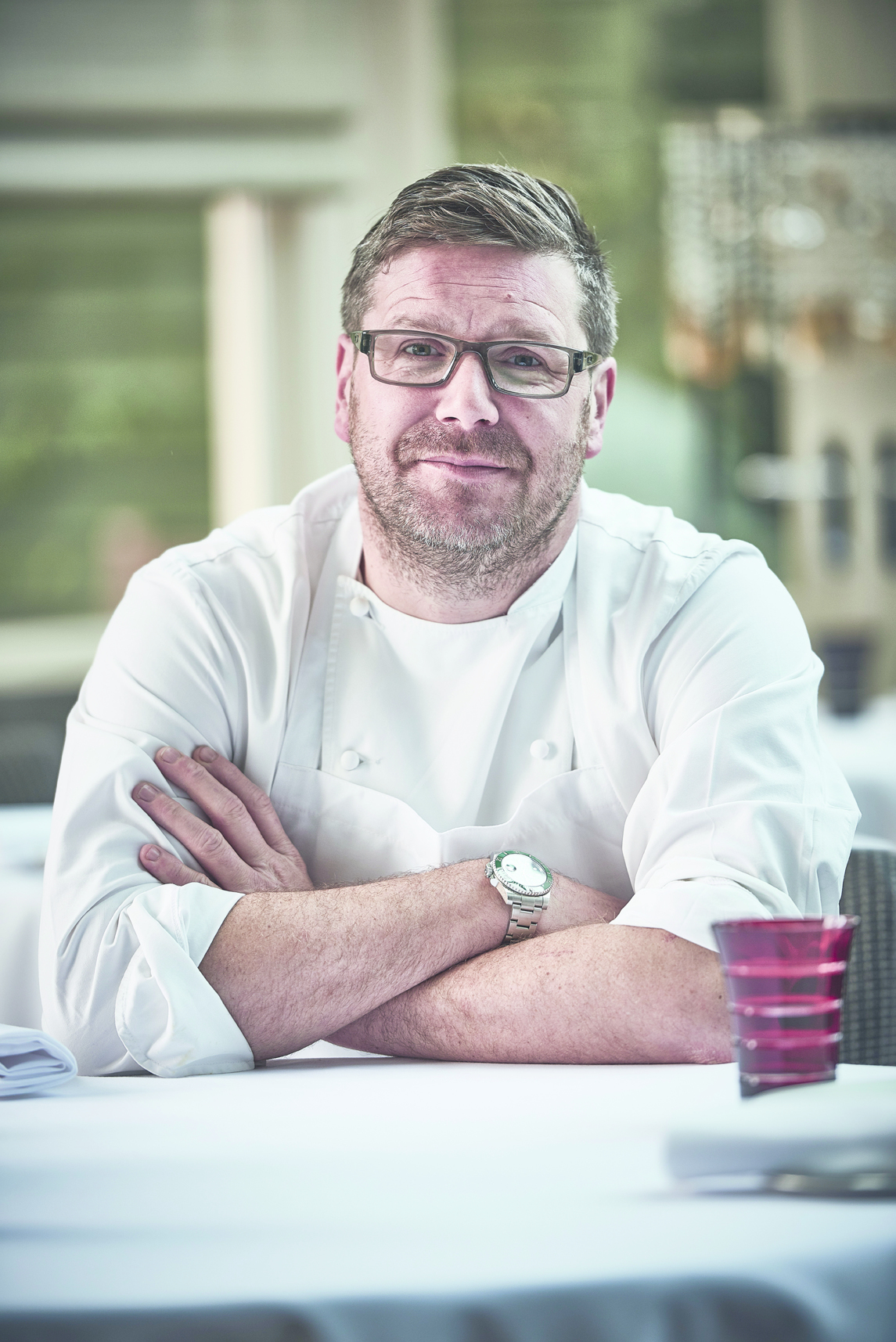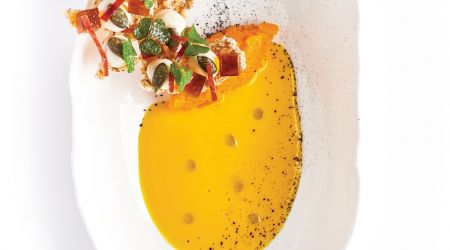A midsummer's dream -
Daniel Clifford started cooking aged 15 in the kitchens of Kent University on a work placement. His first job was at Howfield Manor near Canterbury, where he spent two years under Andrew Leech. He then moved to The Bell in Buckinghamshire to work with David Cavalier, before heading to The Box Tree in Ilkley, which was one of the first UK restaurants to win two Michelin stars. After a short stint with Marco Pierre White at Harveys, he moved to France, before returning for his first head chef’s role at Rascasse in Leeds. In 1998 he opened Midsummer House. In 2005 it won its second Michelin star. He won Great British Menu in 2012 and 2013 and now part-owns Essex pub Flitch of Bacon with Tim Allen.
It's almost as if Shakespeare had Daniel Clifford's Michelin two-star restaurant in mind when he quilled A Midsummer Night’s Dream, such are the parallels that can be drawn between the two tales. Both romantic, both epic. Both not without their share of sadness and loss. But both tales of passion, devotion, success and triumph against the odds.
At first glance, Midsummer House looks a magical setting for a restaurant. In the heart of Cambridge on the brink of Midsummer Common and the banks of the River Cam, to an inexperienced restaurateur it must have appeared a dream spot. In reality – as Daniel Clifford found when he opened in 1998 – it was a crumbling 18th-century building set below the water table with no room to expand and no parking. Although, 20 years on, it’s one of the finest restaurants in the country. He’s clearly doing something right. ‘I pinch myself on a daily basis,’ says Clifford as we sit in Midsummer’s light-flooded conservatory on a scorching afternoon. ‘When I first got two stars, no one knew Cambridge for fine dining and it was the biggest shock in the industry that year. This place, this restaurant, it’s been my life and I absolutely love it.’
It’s no secret that Midsummer House has had its fair share of setbacks. A spat with animal rights campaigners saw bricks being thrown through the windows, graffiti on the walls and foie gras off the menu. In 1998 the Cam burst its banks and left the restaurant underwater. In 2000, it happened again, the week after Clifford had invested £12,000 in the wine cellar. ‘I was standing in the floodwater with a bottle of Petrus in one hand and the label in the other. It wasn’t insured,’ he says. His investor told him he would have to lay off his staff and shut for six months, though Clifford saw it as an opportunity.
‘We ripped up the floors and chucked them on the Midsummer Common bonfire. I told my team they could either muck in and help or find other jobs.’ To a man, they stayed. ‘While we were at it I was questioning everything. I’d inherited all of the fixtures and furnishings. Suddenly, everything was changeable. The £120,000 we got from the insurer meant that I was able to put my stamp on things outside the kitchen – it all started coming together.’
The 40-cover Midsummer House was awarded its second star in 2005. Great news, right? ‘Getting the second star was the worst thing that could have happened to me,’ Clifford says with the kind of intensity I’ve heard about from other chefs. ‘It made me into an animal and scared the hell out of me. I thought that every table was an inspector so everyone in the kitchen got killed every time they messed up.’ But did his intensity improve the customer experience? ‘No, it made it worse. Does a diner want to hear me shouting every two minutes, making someone cry because they overcooked the potatoes? It happened day after day – it was the only way I knew.’
It’s easy to say that this
kind of behaviour is out of
order. That he’s a dinosaur;
a bully. But that was and
still is the reality in many
kitchens. Clifford learnt his
craft from the best chefs in
the world; they just happened
to employ a particular style of
man-management. Aged 17,
he was offered a job working
for Marco Pierre White at the
infamous Harveys, at the time
the UK’s best restaurant and
what proved to be White’s
magnum opus. In his first
month he saw White sack a chef for breaking his toe
when he kicked him, and a brigade ‘that drank so much
alcohol that tempers were
always short’. He moved to
work at Provence restaurant
near Southampton, where chef
Toby Hill ‘wore nunchucks on his belt’, and then to the Château Belmont in the
Loire Valley, where chefs were
‘determined to break me’. His
last job working for someone
else was at Rascasse in
Leeds, where he and owner
Simon Gueller got through
197 staff in their first year, such
was the volatile atmosphere.
Behavioural patterns are
learnt, not taught.
Daniel Clifford opened Midsummer House aged 25 off the back of these experiences, an age where most chefs had barely finished college. He makes no apologies for his past. ‘Who teaches management in hospitality? You learn people’s ways. It was an industry of bullying. You weren’t asked things politely. This still happens and it will always happen,’ he says. ‘You can bring in as many HR people as you want but at the end of the day, this environment attracts people like me. People who didn’t do well at school, people who are used to defending themselves. All I know is there are lads downstairs who’ll go off and achieve more than I have and I’ll be happy that I’ve been part of their journey. Yes, I might have pinned them to the wall, but my point is there are times when you need that.’
To say Clifford is a changed
man is probably over-egging
the pudding, but his outlook
is sanguine. He suggests that
writing his candid, visceral
new book Out of My Tree
was cathartic. ‘I’ve been in
counselling for 19 weeks since
finishing the book as it made
me ask a lot of questions
about the man I am. I now look forward to the sessions
and it’s taught me that if I’m
relaxed, the restaurant will be
better. I’ve had a rough couple
of years in my personal life,
which had me in some really
dark places, but now I’m
through it, I’m the happiest I’ve
been.’ His clear headspace is
reflected in the restaurant. He’s
just completed a clean-lined
refurbishment and earlier this
year he went back to offering
an à la carte menu, a decision
that will cost the restaurant
thousands and that led to what
he describes as a ‘rebirth’.
‘I’d been creating robots doing tasting menu only. What am I teaching them? Sure, they know how to cook a quail after doing 50 a service, but they learn how to disrespect it, too.’
With a mellowed outlook, Clifford is ready to push to the next level. I venture that now he’s no longer defending the two stars, he’s ready to push for three. ‘I’m cooking the way I want with the ingredients I want to cook with and I’m excited. I don’t want to follow trends. I’m the happiest I’ve been in 20 years. I’m watching the apples on the tree grow and feeling inspired.’ And when Clifford feels inspiration, stardust tends to follow.

Recipes
Get Premium access to all the latest content online
Subscribe and view full print editions online... Subscribe

